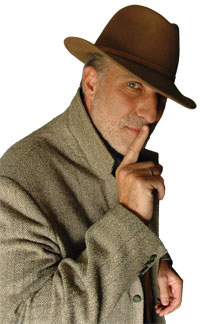
Spotlight
 The
Truth Is Out There The
Truth Is Out There
Professor Robert Goldberg has his finger on the pulse
of American conspiracy theory.
by Jason Matthew Smith
There’s a brief lull between radio interviews, long enough for
U of U Professor of History Robert Goldberg to sit back in his chair
and suck on a Tootsie Pop. Goldberg, recently named director of the
Tanner Humanities Center, has been in high demand during 2006—the
fifth anniversary of the 9/11 attacks—because conspiracy theories
about the events of that day are coming hot and fast, and he’s
the nation’s go-to guy for tracing their evolution.
Goldberg emphasizes that he is not a conspiracy theorist. He is first
and foremost a historian, endlessly fascinated by the highs and lows
of 20th-century America. But since his work centers on social movements
and, specifically, conspiracy theories after World War II, he’s
often hit with the Big Questions, on-air and off: Who really shot JFK?
(Answer: Lee Harvey Oswald.) And what did the government do with the
aliens that crash-landed at Roswell in 1947? (Answer: Nothing; there
was no spacecraft.)
Long before sparring with talk-show callers and penning books and
articles on Jewish history, the Ku Klux Klan, and Barry Goldwater (his
other research interests), Goldberg was a dyed-in-the-wool New York
lad, living in New Rochelle and Manhattan until his teenage years. That
changed when his family moved to Phoenix, Ariz. “That’s
what made me a Westerner,” he says, and he’s been enthralled
with the West ever since.
Goldberg received a B.A. from Arizona State, master’s and doctoral
degrees from the University of Wisconsin-Madison, and first made a name
for himself through research on the Klan, poring over miles of documents
on microfiche until his eye could easily pick out the letter K on a
page of dense text.
He arrived in Utah 26 years ago with his wife and two sons (the eldest
now works for the U.S. Department of State; the youngest is studying
in Jerusalem).
Goldberg had ostensibly been hired to replace Emeritus Professor of
History Brigham Madsen, but, he thought, “Oh my god, I’m
in trouble now,” he says. “Here’s this Jewish kid
arriving in Utah to replace a historian named Brigham.”
But his fears were unfounded, and Madsen took Goldberg under his wing.
Goldberg considers Madsen the most significant influence on his career,
and they are still close friends.
Then, another major influence arrived in the ’90s when conspiracy
theory and its disciples edged into the mainstream. Goldberg’s
curiosity was piqued by the emergence of conspiracy theories in the
media and in the popular imagination: The X-Files on TV, Oliver Stone’s
JFK on the big screen, Y2K on everyone’s mind. Soon he was knee-deep
in research and finding that conspiracy theories, while always a part
of American culture, have been gaining traction in recent decades. “Nine-eleven
was easily incorporated into the standard plot lines of American conspiracy
theories,” he says. “Once again, conspiracy theorists accused
the usual suspects for the same age-old reasons of plotting to betray
America.
“There has been a massive erosion of faith in entities and organizations,”
Goldberg says. Polls show that few Americans now trust the government,
compared with 75 percent just 30 years ago. “When you have that
erosion of faith,” he says, “people look for an alternate
authority.”
Cue the conspiracy theorists, who step in to fill the authority vacuum,
with Goldberg analyzing and chronicling the scene every step of the
way.
–Jason Matthew Smith is editor of Continuum
Download
the Podcast of journalist Ted Capener's interview with Robert Goldberg
Return to Winter 2006-07 table of contents
|



